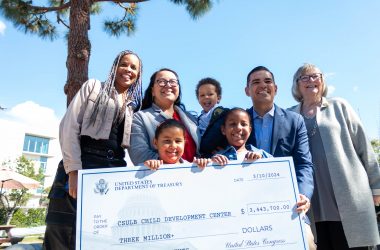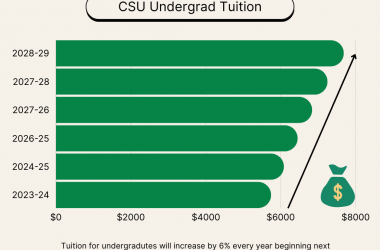Six months ago, Cal State Long Beach student Jordan Hattar was filming a refugee camp in Jordan when a man suddenly grabbed him from behind and threw him a vicious punch.
At best, it was just an angry person, and at worst, Hattar’s friends worried it could have been the Mukhabarat — heavy-handed political informants in the Arab world. Hattar said if it was the latter, they probably wanted to intimidate him so he would stop filming in the area.
This June, Hattar is going to brave another trip back.
Hattar spent last fall delivering humanitarian aid in the Zaatari refugee camp, located about six miles east of Mafraq in Jordan, where the two-year-old Syrian civil war continued to spill terror into the refugees who had fled the country.
“After you learn a certain amount of what is going on in the world, you have the obligation to care,” the 21-year-old international studies major said. “[They] need proper housing, so I want to get them caravans.”
Hattar said he is concerned about refugee housing because the khaki tents currently in Zaatari barely protect the refugees from heat, dust, cold nights and heavy flooding in the desert.
When Hattar came back to the U.S. late last year, he started a fundraising project and raised $12,000 to buy caravans, or mobile homes that would better shield the refugees from extreme weather. Hattar said 100 percent of the aid raised will go toward the cause.
“Children are dying in these camps,” he said. “I was told [the caravans] need to go through [the United Nations High Commissioner for Refugees,] but I want to figure out why these haven’t been delivered in the quantities they should be.”
Hattar, who is a third generation Jordanian, said he is trying to set up a meeting with the king of Jordan to discuss his caravan project and see if it matches up with the Jordanian government’s plans.
“I want to try to convince [the king] that caravans are what the [Zaatari camp] needs most because that’s what [the refugees] told me they need,” he said.
Looking back, the San Luis Obispo native said he did not always dream of becoming a humanitarian. In fact, many from his community knew him as “the basketball guy.”
“Until I was about 16 or 17, I thought I wanted to be a professional NBA basketball player,” Hattar said. “I guess now I want to be like Ghandi.”
Hattar’s concern for world issues began when a high school teacher told his class about the genocide in Darfur, a region in western Sudan. Hattar said he was so moved that he spent his junior and senior years spreading awareness about what was happening in Sudan and contacting various people for aid.
Days after his high school graduation, Hattar said he found himself delivering mosquito nets and teaching Sudanese children in a village named Malek.
His focus switched from Sudan to Syria after his CSULB Arabic professor Iman Hashem told a story about her relatives who remain in Syria.
“I saw her cry in class — it was really emotional,” Hattar said. “I wanted to help.”
Despite Hattar’s new direction, he said a Sudanese friend from Malek village told him he should follow his heart.
“I know I will get pulled back to Sudan, but now Syria needs me,” Hattar said.
In April, Hattar was invited to attend the annual Clinton Global Initiative University conference for the second time, which was established by former President Bill Clinton to gather various global leaders and philanthropists to help address world problems. This year, Hattar announced his “Commitment to Action,” a plan to help Syrian refugees.
“In my trip this June, I want to show what I have seen to people I’ve met in the conference,” Hattar said. “I want to get more people to care. That’s where my mindset is at.”
To further raise awareness about the conditions in Zaatari, Hattar also published an article in the Jordan Times and did radio and TV interviews with BBC, during which he talked about life for Syrians in the camp.
“We have to humanize the stories we tell and remind others that these are not monkeys, these are people,” Hattar said. “We shouldn’t hear of people dying and not care.”
University of California, Santa Barbara student Olivia Wong, a fellow humanitarian who met Hattar in Washington, D.C. in 2011, plans to accompany Hattar to Zaatari this summer.
“I’ve heard a lot about Syria, seen pictures of camps, but there is nothing quite like actually being there, where you can really absorb the situation first hand, talk to people face to face and really make that connection with the locals,” Wong said.
Wong said her friend Hattar is a strong-willed visionary.
“If he can conceptualize an idea, whether it is for aid in South Sudan or caravans for Syrians, he is really able to take that vision and translate it into an action that other people can identify with,” Wong said.
Hashem said knowing she is teaching students not only Arabic grammar makes her feel a sense of fulfillment in her profession.
“I am happy I am also teaching them about the world,” Hashem said. “[Hattar] has the good upbringing, the determination and the heart it takes to give a helping hand. He is the right person for this job, and I am very proud of him.”
Hattar said the hardest part about giving aid overseas is being away from his family, but being focused on what his purpose is helps him get through it all.
“My mom tells me what I’m doing is dangerous, and my grandpa jokes that I won’t be able to help everyone anyway,” Hattar said. “But I think once they saw me talk about the same thing every day, they knew this wasn’t just going to go away. I see myself doing this forever.”



